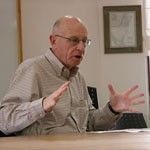By Ira Sharkansky, Ph.D

JERUSALEM — Last week was Yom HaShoah, Israel’s day to remember the Holocaust. There are fewer each year who tell their stories. For the most part, they were very young. Some did not realize what was happening. Christian families received them, and their parents went elsewhere. Christian Churches helped, including the children in their classes or finding homes. Some were reunited with one or both parents after the war. Some came to Palestine, to be brought up by kibbutzim.
It’s closer for Varda than for I. A grandmother and uncle disappeared. My own grandparents arrived in America in 1900 or earlier. I recall a conversation, about 1946, between my mother and grandmother. Relatives in Poland were no longer answering letters.
This week is a day to remember those who fell in war or acts of terror. And this year it’s a day of potential fury. Many of those remembering relatives who died do not want politicians speaking at the cemeteries. Some politicians agree. Others say they will speak carefully. It is a national day. Relatives can visit gravesites on other occasions if they want quiet; usually on the day when someone died. But others are adamant. No politicians!
We’ll see what happens.
Saturday evening was the 16th consecutive week of mass demonstrations. Mostly against proposals to change the judicial process. Tens or hundreds of thousands gathered with flags, shirts, and other indications of their protest. Our local event was the bridge between Bnei Dror and Evan Yehuda over Route 4. We waved flags, and cars below tooted in support. At least 200 appeared at this site.
So far the Prime Minister is quiet about renewing efforts to reform the judiciary after the holidays. The numbers of demonstrations suggest that efforts to go ahead with changes could produce violence.
A quarrel between the Legal Advisor to the Government and the Defense Minister about allowing Palestinians into Israel in order to join a binational demonstration on Remembrance Day. The Legal Advisor sees no problem. The Defense Minister opposes it.
Israel has a lot to remember, and to celebrate its development as a major player in world affairs. More than 9 million population, and a credible armed force.
But remembering the past is sad, as well as getting through conflicts on how to do it, and who to permit at the cemeteries.
Independence Day is supposed to be a time of gladness after the Holocaust Memorial Day and Yom Hazikaron, the day to remember those fallen to warfar or terror.